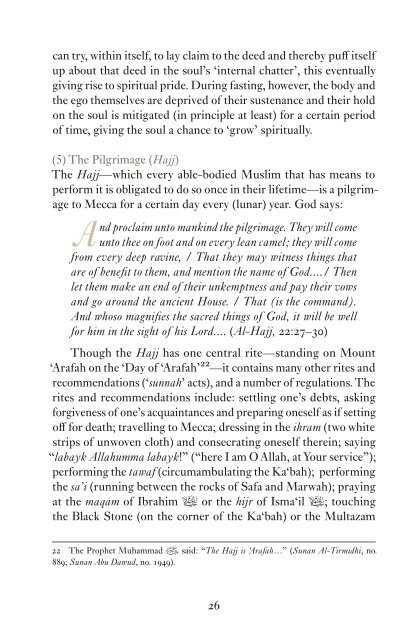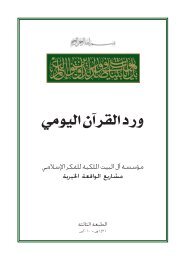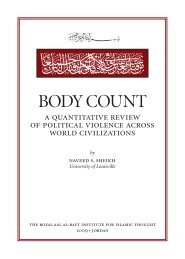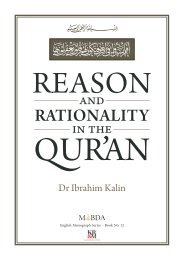You also want an ePaper? Increase the reach of your titles
YUMPU automatically turns print PDFs into web optimized ePapers that Google loves.
can try, within itself, to lay claim to the deed and thereby puff itself<br />
up about that deed in the soul’s ‘internal chatter’, this eventually<br />
giving rise to spiritual pride. During fasting, however, the body and<br />
the ego themselves are deprived of their sustenance and their hold<br />
on the soul is mitigated (in principle at least) for a certain period<br />
of time, giving the soul a chance to ‘grow’ spiritually.<br />
(5) The Pilgrimage (Hajj)<br />
The Hajj—which every able-bodied Muslim that has means to<br />
perform it is obligated to do so once in their lifetime—is a pilgrimage<br />
to Mecca for a certain day every (lunar) year. God says:<br />
And proclaim unto mankind the pilgrimage. They will <strong>com</strong>e<br />
unto thee on foot and on every lean camel; they will <strong>com</strong>e<br />
from every deep ravine, / That they may witness things that<br />
are of benefit to them, and mention the name of God..../ Then<br />
let them make an end of their unkemptness and pay their vows<br />
and go around the ancient House. / That (is the <strong>com</strong>mand).<br />
And whoso magnifies the sacred things of God, it will be well<br />
for him in the sight of his Lord.... (<strong>Al</strong>-Hajj, 22:27–30)<br />
Though the Hajj has one central rite—standing on Mount<br />
‘Arafah on the ‘Day of ‘Arafah’22—it contains many other rites and<br />
re<strong>com</strong>mendations (‘sunnah’ acts), and a number of regulations. The<br />
rites and re<strong>com</strong>mendations include: settling one’s debts, asking<br />
forgiveness of one’s acquaintances and preparing oneself as if setting<br />
off for death; travelling to Mecca; dressing in the ihram (two white<br />
strips of unwoven cloth) and consecrating oneself therein; saying<br />
“labayk <strong>Al</strong>lahumma labayk!” (“here I am O <strong>Al</strong>lah, at Your service”);<br />
performing the tawaf (circumambulating the Ka‘bah); performing<br />
the sa’i (running between the rocks of Safa and Marwah); praying<br />
at the maqam of Ibrahim or the hijr of Isma‘il ; touching<br />
the Black Stone (on the corner of the Ka‘bah) or the Multazam<br />
22 The Prophet Muhammad said: “The Hajj is ‘Arafah…” (Sunan <strong>Al</strong>-Tirmidhi, no.<br />
889; Sunan Abu Dawud, no. 1949).<br />
26















